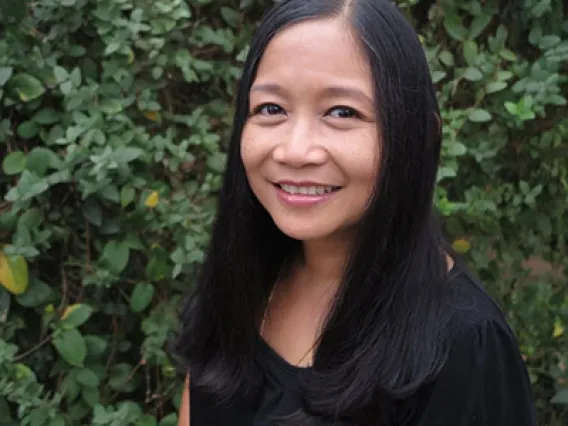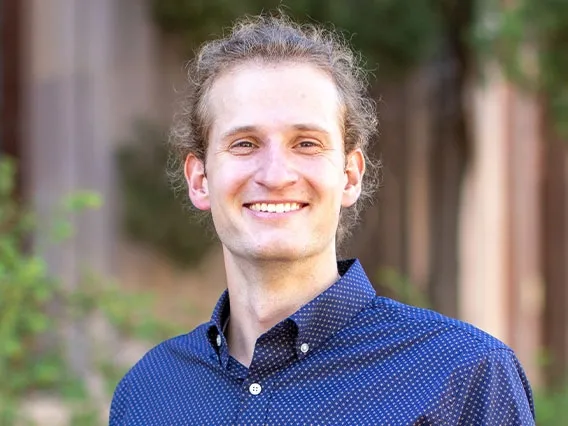Pack Your Bags!
Who’s my coordinator?
- Your Coordinator is the expert on your program. They know the ins and outs of what to expect during the application process and your time abroad.
- Reach out to your Coordinator with any questions on the application or if you want additional details on a program. Coordinators are available by email, phone, or appointment.
- As you prepare to go abroad, you’ll receive program-specific updates from your Coordinator to your University of Arizona email address.
- Not sure who to contact? Reach out to our Peer Advisors in the Global Lounge, or email us!
Who else is on my team?
There are many people who will help you along your study abroad journey. Don’t forget to reach out to the following people when you have questions about their areas of expertise:
- Your Academic Advisor
- The Financial Aid office
- Your host university
- Your bank or financial institution

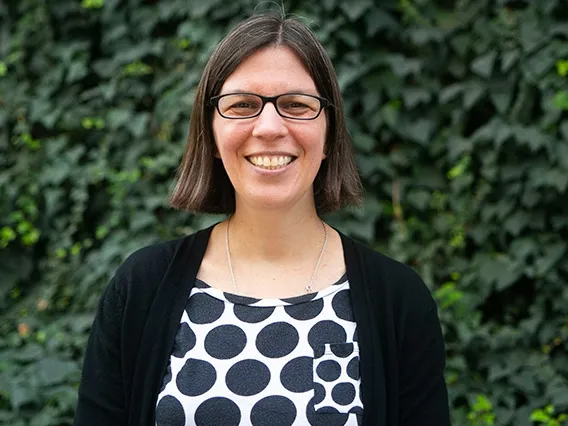
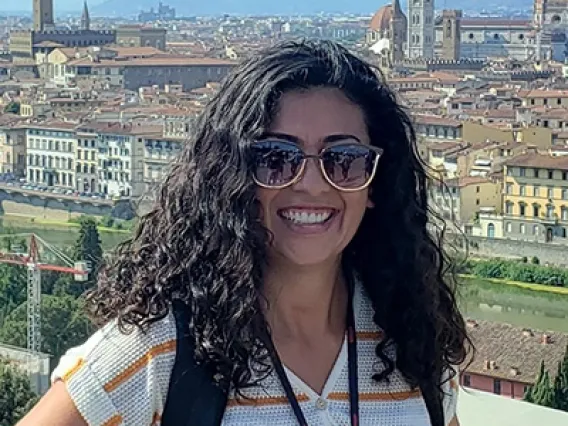
Dafne Johnson
Italy (UA Rome, Dorrance, Global Bridge, Arizona in Orvieto, Accessible Earth)
Email: dafnej@arizona.edu
Phone: (520) 621-0785
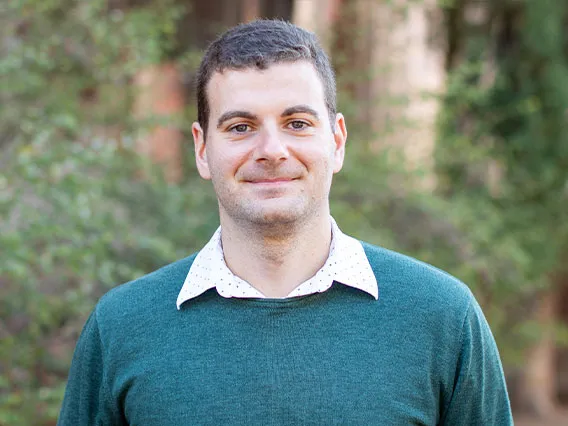
Vasilis Kokkinos | Βασίλης Κόκκινος
Australia & New Zealand, CAPLA Abroad, France, Greece, UA Barcelona (summer)
Email: vkokkinos@arizona.edu
Phone: (520) 621-3930
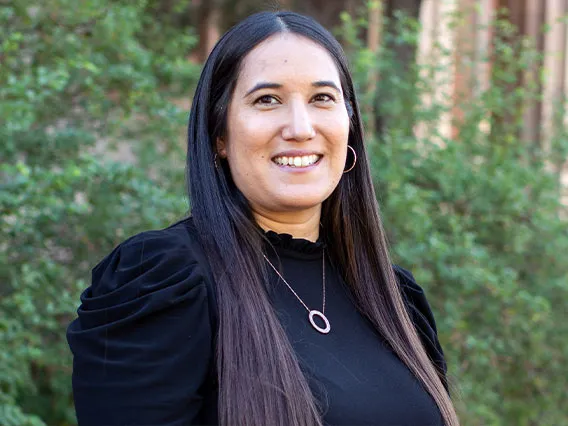
Do you have a passport?
- If not, be sure to begin the process of applying for your passport as soon as possible. The current processing time for passports is 8-11 weeks. If you have not applied for your passport yet, you should do so ASAP.
- There is a U.S. Passport Office right here on campus in the UA Global Center across from the Study Abroad office. You can see the documentation you will need, cost, and other information at the UA Passports website.
- Please Note: The University of Arizona passport office is currently closed. Visit their website to learn more about other acceptance facilities near you.
- For more information about passports, visit the U.S. Department of State’s website on passports.
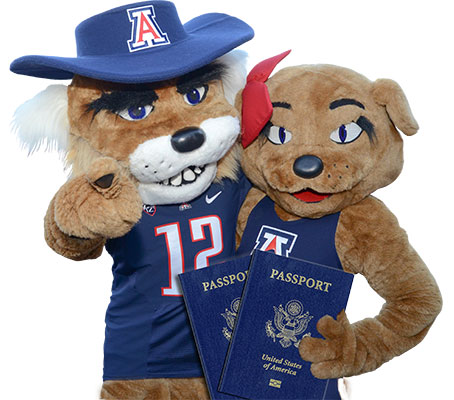
Ready to submit your passport in your application?
- In the “Passport Scan” section of your application, please ensure you upload a clear image of your passport. It can be a cell phone picture as long as it is legible. Make sure to include an image of your open passport with 2 pages: the page with your photograph and the page above with your signature.
- If you do not have your passport and are in the process of applying for it, please upload your receipt and write “Forthcoming” in the questions in the passport section. You can check the status of your passport. Email your study abroad coordinator a copy of your passport scan as soon as you receive it.
Have you scheduled your appointment with the Travel Clinic?
- All students are required to complete a pre-travel health appointment prior to their departure. Schedule your appointment with UArizona Campus Health’s Travel Clinic or an external Travel Clinic. During your Travel Clinic appointment you will learn about the vaccine requirements specific to your destination.
- Since vaccine requirements for COVID-19 and other illnesses vary by country, you should review your childhood and current vaccine records and bring this information with you to your travel clinic appointment.
- For more information on country specific vaccine restrictions, check the Skyscanner COVID-19 travel search.
Have you checked on your prescriptions?
- Before you depart for your upcoming life-changing study abroad trip, you’ll need to talk with your primary care physician or your pharmacist for your prescription medication needs and general health precautions.
- Please be sure that you understand the country specific restrictions for your prescriptions and can access or bring your medications abroad. Learn more about the steps you should take to verify the legality of your prescription drugs in your host country on our Health & Safety webpage.
How can you support your health while abroad?
- Whether you need support for a pre-existing condition you discussed at your health appointment or find yourself unexpectedly ill while abroad, the University of Arizona has resources in place to help you get the care you need.
- Once you commit to your program, you'll be enrolled in Geo Blue (a form of international health insurance) and their Global TeleMed and Wellness Assist programs. There's even a Geo Blue app you can use for quick access to these services.
- Additionally, you can always reach out to Counseling & Psych Services (CAPS) on campus to find out more about your mental health support options abroad.
- If you are currently working with a health practitioner to address any of your physical or mental wellness needs here in Arizona, talk with them before you depart to set a plan of action for managing your health or any specific conditions while abroad.

What is Pre-Departure Orientation?
- All students are required to complete Pre-Departure Orientation through D2L prior to departure. The D2L course contains 9 modules covering important topics ranging from health and safety to packing and prepping. This orientation is self-paced, and most students complete it within a few hours.
How do I enroll in Pre-Departure Orientation?
- Once you are accepted to your program, complete your commitment form. Then, you’ll find instructions for how to self-enroll in orientation in the post-decision section of your application.
- If you committed to your program but have not self-enrolled in Pre-Departure Orientation through D2L by the time the commitment deadline passes, the Study Abroad team will enroll you. We will also send you a reminder email that it’s time to login and complete orientation.
- Make sure you give yourself plenty of time to finish orientation and ask any questions before you depart.
What if I have questions about Pre-Departure Orientation?
- It’s natural to have questions as you get ready to embark on your upcoming journey. The Study Abroad team is here to help. You can always contact or meet with your Study Abroad Coordinator. We are part of your team so let us know how we can continue to support you through all phases of your study abroad journey!
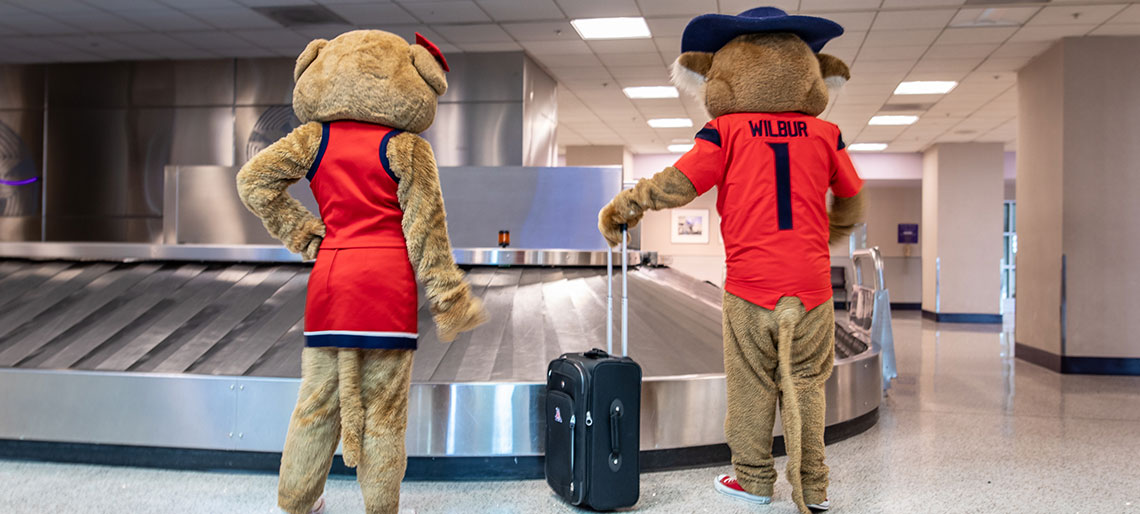
Ready?
Congratulations on being accepted to your study abroad program! At this point you might be feeling overjoyed, excited, and even overwhelmed about the brand new and unknown experiences you’re about to have. As you’re considering what to pack and which sites you want to see most, we recommend considering your mindset and having an open mind about your experience ahead.
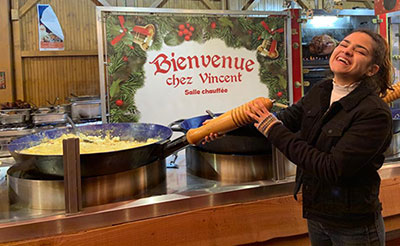
“The takeaways from my study abroad trip are countless and extremely valuable, especially because I really pushed myself to get the most out of it. What I mean is, I was a "yes" person. If everyone is going on a sunrise hike and you're not a morning person or you don't like hikes - my advice would be to say yes anyway! Take in everything the program and city have to offer.” (Peer Advisor Lucy)
Set?
Make a plan! Part of the study abroad experience is getting to site-see, try new food, and check things off your bucket list. We always recommend you prioritize the top things you want to see and do. That being said, be ready for unexpected changes. The weather might interfere with your plans, national holidays you aren’t aware of could close museums/sites, or there could be a festival or rally taking place that causes delays in traffic. Get in the mindset now so you are ready for anything that life abroad sends your way. Make plans but be flexible if your schedule has to change at the last minute. Afterall, you might find adventures along the way that you never could have researched ahead of time.
Hear about another student’s experience with mindset and flexibility here.
Go!
It’s time to get ready and go! Remember the goals you set for yourself when you first started thinking about studying abroad. Whether they are for academic, personal, or professional growth, now is the time to dive in and gain the experience you were looking for. Keep in mind, once you get abroad your goals may evolve and change while you’re experiencing new things every day.
There are many ways to track your progress towards your goals and share your memories with others.
- Participate in the Annual Photo Contest
- Start blogging or create study abroad content on TikTok or Instagram
- Follow us and tag us! (@uastudyabroad) & Use our hashtag! (#WildcatsAbroad)
- Become a Study Abroad social media ambassador
How do I manage my money abroad?
Living and studying in another country is an exciting time! By planning ahead and developing a budget, managing expenses while abroad can help keep you focused more on your experience and worry less about unexpected expenses.
- Discuss: Review what kind of study abroad expenses to expect with a Study Abroad Coordinator, Peer Advisor, or your parents and family.
- Research: Use this cost of living calculator to look at expenses such as grocery and ground transportation prices in your host city as compared to Tucson. Get familiar with what currency your host country uses, and how it compares to the U.S. Dollar. Currency conversion websites like the one linked will help you look up current exchange rates, which can fluctuate day-to-day. You can also start considering the costs of attractions, activities, and independent travel that you’re looking forward to.
- Prepare: Practice building your study abroad budget in the Student Guide to Budgeting & Packing so you can plan ahead for expected (and unexpected) expenses. As you create a budget, also keep these tips in mind.
- Live like a local: While abroad, live, shop, and eat like a local. Small things like shopping at the local market instead of large chains can save you money. Take the opportunity to cook at home (if possible) and try local recipes balanced with the planned expenses of eating at restaurants. Together this will help you have the most authentic experience while also being conscious of your budget.
-
Shop Smart: Often, shops and restaurants near high-tourism destinations can be more expensive or even over-priced. Avoid these “tourist traps” by packing a lunch or doing your research ahead of time. Here is a great resource for shopping smart.
How do I get local currency?
- Depending on your bank and host country, you may not be able to use your credit card, or may be charged fees for transactions and withdrawals. Talk to your bank or financial institution to discuss international travel.
- Your bank may be able to exchange some local currency for you before you go. If possible, bring around the equivalent of $100-150 USD in your host county’s local cash in case you have any trouble accessing currency when you first get abroad.
- Alternatively, you can exchange US dollars for local currency at the airport. Talk to your Coordinator to see what they suggest for your program.
Where can I learn about my program destination?
Now that you’ve been accepted to your program, it’s time to get excited and research your host country! We recommend looking up information about local culture, the food you can look forward to, other places nearby you can visit, the typical weather to expect.
Brush up on your language skills! Check out Duolingo or another free language learning app. While being bilingual is not a requirement to study abroad, learning some basic phrases in the local language of your host country will help you navigate your experience easier and make better connections with your host community.
- You may want to know how to say your numbers 1-10, ask how much something costs, greet and thank people, and any other day-to-day phrases you think you’ll need.
How do I prepare for cultural adjustment?

When you arrive at your destination and start to get settled in, you will probably start to notice tons of differences between your life abroad and your routine at home. These differences may be small, like eating dinner at 9pm, or larger, like needing to reconsider your wardrobe to meet cultural norms. While it’s exciting to learn about different cultures, these everyday differences might start to add up and feel overwhelming. This disorientation is known as culture shock. Culture shock is completely normal, and you should expect to feel it on some level as you adjust to your life abroad.
Study Abroad Peer Advisor Lucy (Paris, Academic Year 2019-2020) shares, “It’s okay to be nervous, but it's important to keep your mind in the moment. Of course, you may experience homesickness or embarrassing situations–it’s obvious you're a foreign student–so just enjoy! Appreciate the little things by making friends and paying attention to the beauty around you.”
Lee Ann Hamilton from Campus Health (Assistant Director, Health Promotion & Preventive Services) explains, “Many students may feel different in another country, and perhaps after the "honeymoon period" of loving everything new, it's common to get frustrated and critical of the new culture. Realize that you or the culture feeling "different" doesn't mean right or wrong....it simply is different....and that's o.k.”
Here are some tips to cope with culture shock:
- Get to know other international students who might relate to what you’re going through.
- If you start to feel down, your tendency might be to isolate from others, but instead make sure that you stick to a regular class and social schedule.
- Bring some comforts from home (pictures, hobbies, recipes, etc.).
- Keep an open mind and try to limit comparing (or keeping score) between your study abroad country and your home country.
- Look for the similarities that most humans share: love of family, sense of purpose, art, music, sports, etc.
- Remember that everyone takes time to adjust and may adjust at different speeds.
- Observe locals in public spaces and low-pressure situations to get familiar with norms.
- Stay active and establish a regular sleep schedule.
Lastly, don’t be afraid to reach out to a mental health professional. When you are abroad, you will have access to Global TeleMD (virtual confidential access to international doctors) and Global Wellness Assist (virtual confidential professional counseling) through GeoBlue Insurance. Once you receive an enrollment confirmation from GeoBlue, download the Geo Blue mobile app and register your account for quicker access to mental health support.
What should I pack?
The specific items you should pack will depend on your host country and the time of year you’ll be there. Do some research on your host country’s climate and norms to start thinking about what you should bring. Also, be mindful of different airlines’ weight and size restrictions for your luggage as you consider what to bring.
In general, here’s what you should expect to bring:
- Important documents
- Don’t forget your passport!
- Money
- Do you have access to your host country’s cash? Can you use your debit card at ATMs or credit card to make purchases?
- Technology
- What do you need for class? Does your host country use different outlets?
- Climate and activity-appropriate clothing
- Which seasons will you experience abroad? What do you expect to do?
- Toiletries and medications
- What do you need for your daily routine? Do you wear contacts or have prescription medications?
Here are some resources that may be helpful as you start packing:
- Check the Study Abroad Calendar for Pack Your Bags events (typically held near the end of each semester).
- Refer back to our Packing Guide
- Listen to the Global Wildcat Voices Podcast’s Packing episode.
What else can I do to prepare?
- Check your UofA email frequently for important instructions from your Study Abroad Coordinator and your host institution.
- Do not purchase your flights until you receive instructions to do so from your Study Abroad Coordinator.
- As you set your travel plans and itinerary, share them with your emergency contact and check your UofA email for instructions on sharing them with your Coordinator or host institution.
- Review the Top Tips for Wildcat World Travel document for packing, luggage, and flight recommendations.




